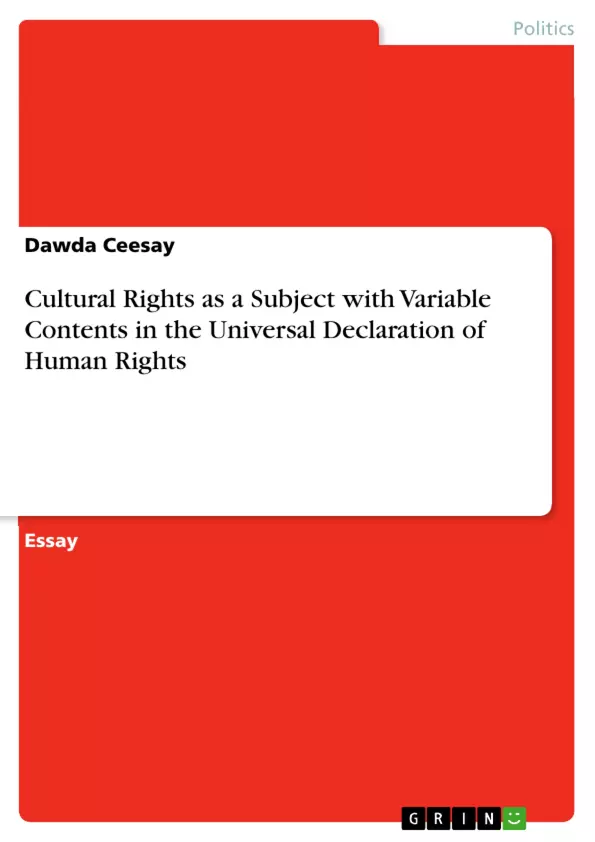This article is written on the subject of cultural rights as human rights. It discusses the various subjects found as content areas for cultural rights. The primary source of information for the support of this article is secondary sources (written literature). The article discusses so many relevant aspects of cultural rights as enshrined in the Universal Declaration of Human Rights (UDHR).
During the thirty-seventh session of the general assembly meeting, the United Nations gave a new recognition to the promotion of cultural rights and heritages. The assembly calls upon all states to respect, protect and promote the rights of every individual to partake in cultural life. It also urges all parties to armed conflict to respect and refrain from attacking cultural properties. Furthermore, the General Assembly encouraged all states to become part of the relevant treaties aimed at protecting cultural heritage. The above and many other issues were specified by the UN General Assembly on the promotion and protection of cultural heritage.
Inhaltsverzeichnis (Table of Contents)
- Introduction
- The concept of cultural rights
- Some important contents of culture
- The Right to Participate in Cultural Life
- The Right to Benefit from Scientific Progress and Its Applications
- The Right of Everyone to Benefit from the Protection of the Moral and Material Interests Stemming from All Scientific and Artistic Productions She/He Has Created
- Education and Training
- Communication and information
- Cultural cooperation
- Principles of democratic governance
- Insertion within the economy
- Responsibilities of international organizations
Zielsetzung und Themenschwerpunkte (Objectives and Key Themes)
This text aims to examine the concept of cultural rights as a subject with varying contents. It explores the various aspects of cultural rights and their connection to human rights in general.
- The diverse nature of cultural rights
- The relationship between cultural rights and other human rights
- The role of international organizations in promoting and protecting cultural rights
- The importance of democratic governance in ensuring the realization of cultural rights
- The economic implications of cultural rights
Zusammenfassung der Kapitel (Chapter Summaries)
The text begins by introducing the concept of cultural rights and its relevance in international law. It then delves into the diverse contents of cultural rights, exploring various aspects such as the right to participate in cultural life, the right to benefit from scientific progress, and the right to intellectual property.
The text then focuses on the role of education and training in promoting cultural identity, highlighting the importance of cultural diversity and respect for other cultures. It also explores the right to communication and information as crucial elements in fostering cultural understanding.
The text further examines the importance of cultural cooperation and the principles of democratic governance in ensuring the realization of cultural rights for all individuals and communities. It concludes by emphasizing the economic implications of cultural rights and the responsibilities of international organizations in promoting and protecting these rights.
Schlüsselwörter (Keywords)
The main keywords and focus topics of the text are cultural rights, human rights, cultural diversity, democratic governance, international organizations, and economic implications.
Frequently Asked Questions
What are cultural rights according to the UDHR?
Cultural rights are human rights that ensure every individual can participate in cultural life, benefit from scientific progress, and protect their artistic or scientific productions.
What does the "Right to Participate in Cultural Life" entail?
It urges states to respect and promote the ability of every person to engage in the cultural activities of their choice and to protect cultural heritages from attacks, especially during conflicts.
How do cultural rights intersect with education?
Education and training are crucial for promoting cultural identity and diversity, fostering respect for different cultures, and ensuring the realization of cultural rights.
What is the role of international organizations in cultural rights?
Organizations like the United Nations encourage states to join treaties aimed at protecting cultural heritage and promoting international cultural cooperation.
How does democratic governance support cultural rights?
Democratic governance provides the principles necessary to ensure that cultural diversity is respected and that all individuals have a voice in cultural and scientific life.
What are the economic implications of cultural rights?
The text explores how cultural rights are inserted within the economy, including the protection of moral and material interests stemming from artistic and scientific creations.
- Quote paper
- Dawda Ceesay (Author), 2023, Cultural Rights as a Subject with Variable Contents in the Universal Declaration of Human Rights, Munich, GRIN Verlag, https://www.grin.com/document/1355641



